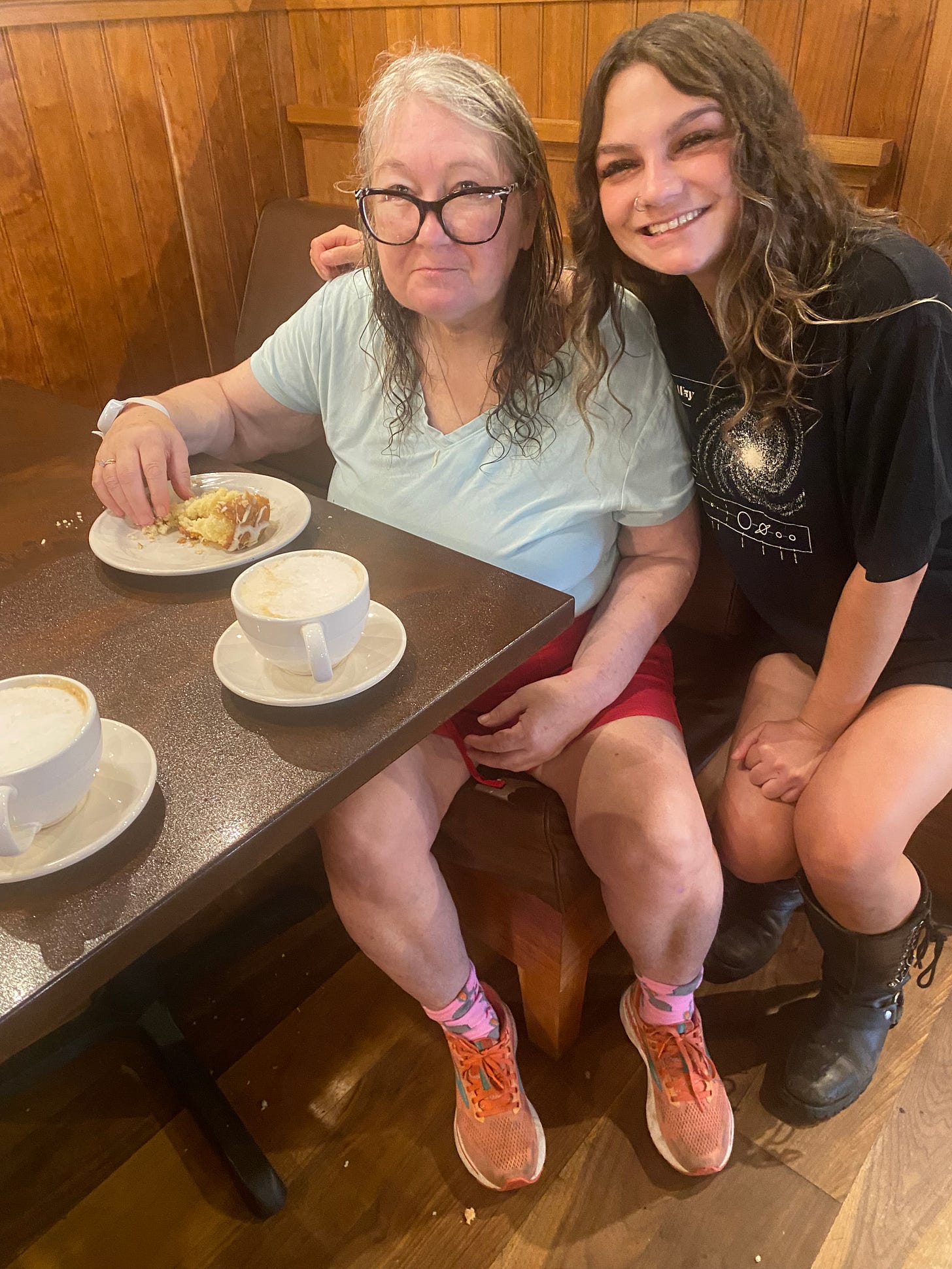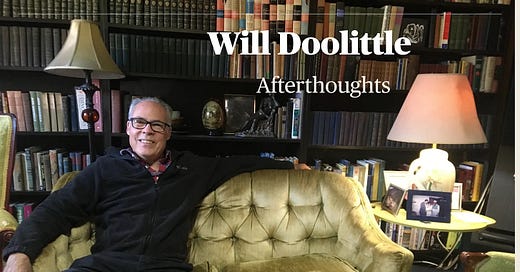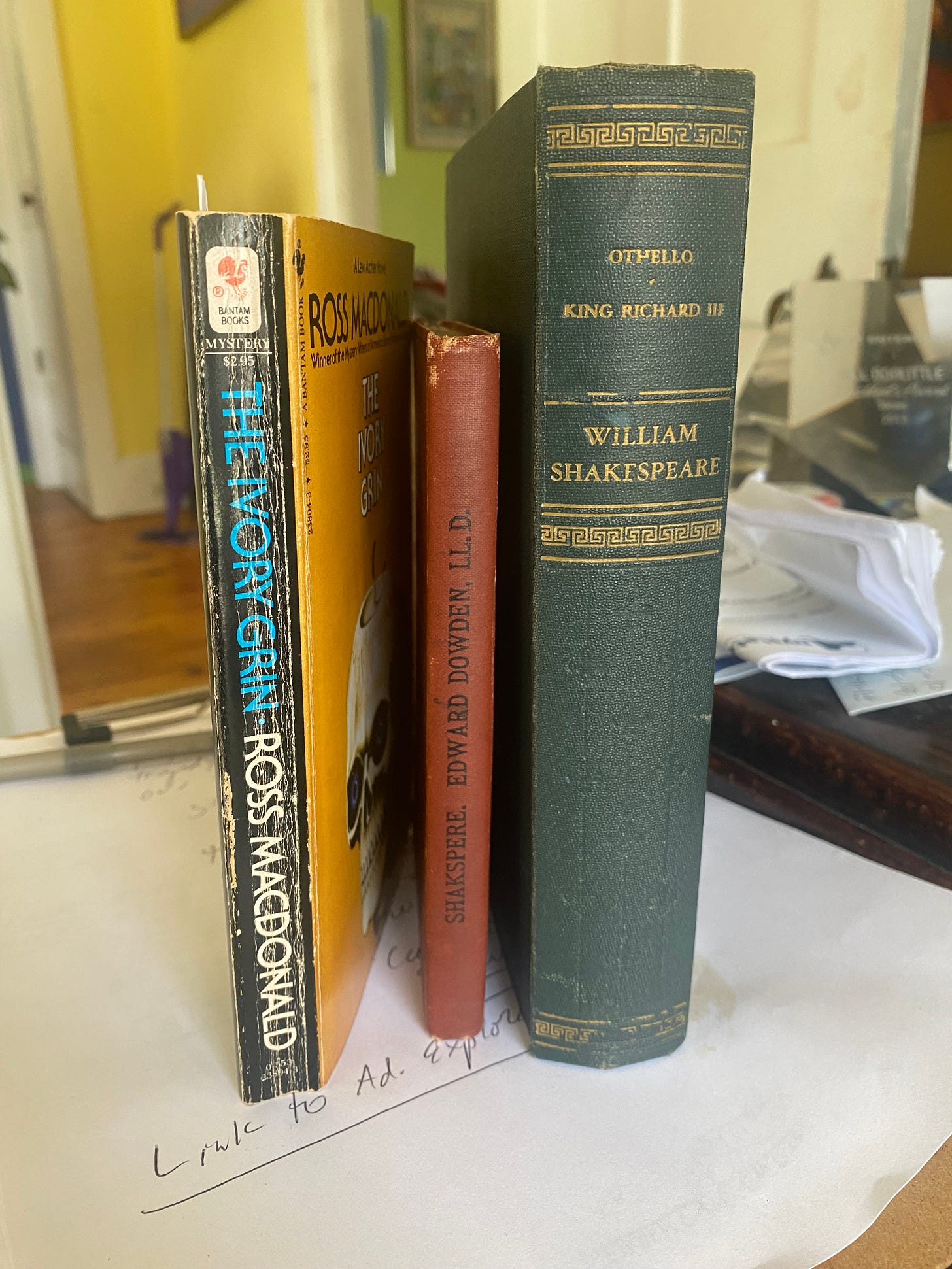We are kind and cruel, generous and awful
Books are the best, as these excerpts prove
Please consider supporting The Front Page with a paid subscription: HERE
Bella and I were sitting in a booth Wednesday at Uncommon Grounds coffee shop in Queensbury when she put her plastic cup of iced coffee down on the edge of the table and let go of it.
The cup tipped over and spilled ice, milk and coffee down her shirtfront, into her lap, onto the seat and the floor.
“No problem,” I said, grabbing the empty cup and sweeping some ice off her shirt. “No big deal.”
“Here’s some napkins,” said a woman who had been sitting nearby, handing me a wad of them.
“That’s fine. Just leave that. We’ll get it,” said Al, a coffee shop employee who had materialized at my elbow.
Heads turned, and it seemed for an instant the attention of the entire busy shop, unaware of us a second before, was now focused only on us. But the attention felt like concern, not disapproval.
We’re regulars at the shop and several times have been approached by other customers who recognize us from this column and smile and say hello.
People enjoying their own coffee and muffins have jumped from their seats to help as we tried to get in or out of the shop, because doorways are scary for Bella, who has Alzheimer’s disease, and holding her hand and the door while guiding her through can be tricky for me.
To order, you stand in line, say what you want, then back up and wait or go to your seat and listen for your “two small lattes with whole milk!” to be called out or whatever your order is.
We’ve gotten to know a few of the employees a little bit. Angelina yells to us when she spots us in line and she and Al will deliver our drinks and muffins to our booth when they’re not swamped.
“Hello Bella. It’s nice to see your face today,” Angelina said on Thursday morning when we showed up.
Sometimes, Bella is in a trance that voices don’t penetrate and will continue to stare at nothing while I or someone else tries to talk to her. But on Thursday, she turned her head toward Angelina’s voice and her eyes lit up.
“There’s that beautiful smile!” Angelina said.
A few weeks ago when we were taking a walk through downtown, I noticed a man watching us from a table inside Spot Coffee. We crossed Glen Street, then went down Exchange between Davidson’s and Downtown Social and into the Elm Street parking lot.
A pickup truck came up behind us, and the man from Spot Coffee got out.
“I recognized you from your columns. I wanted you to know, your work is being read and appreciated,” he said.
“Thank you,” I said.
“That was nice,” Bella said as we walked down the alley near Glens Falls National Bank, where the tellers give Ringo biscuits whenever we come in.
I doubt the tellers or the servers at the coffee shop read these columns, and I don’t often explain to people Bella’s condition. But they understand without being told.
Small acts like a smile or a cheery greeting or a special trip to deliver a muffin can change the shape of a day, especially when your days comprise a series of struggles to accomplish ordinary things, like getting your loved one’s clothes on or getting her into bed at night.
Everyone has troubles and some of them are overwhelming and heartbreaking and harder and worse than mine and Bella’s. Kindness helps us all to keep going, especially during this anxious time.
And when strangers smile and bend down to pet Ringo, I tell myself people are kind. And when they hold the door for us, I murmur silently that they are good.
But when I read about the billions in the Republican budget for seizing and detaining migrants, I think people are cruel. And when I see that the wealthy get tax breaks while money for health care is slashed, I surmise that people are greedy.
Our little local world is filled with generosity and humanity at the same time the larger world, where big things get done, is dark and mean-spirited. But it is we who create both worlds — we the people, no one else — and that is what is so disconcerting.

Poem
Here is a poem by Hudson Falls poet Richard Carella:
Odysseus: (Afterwards)
I heard a siren sing once; and,
as she drew me from myself and close to her
(who I was wont to fear), I realized,
far from wishing my destruction on the rocks to which she clung,
that she was lonely– and imprisoned...
as much as I –bound fast to mast and mission–
was imprisoned on that hopeless ship toward which she cast her net-of-songs.
* The source of her songs’ power (and why they were so painful to the soul,
if not the ear) lay in their mournful cries for freedom...
the kind that can’t be given: and that we must fight to win.
* And yet, (strangely) as she sang– against all reason...
and if only for an instant, as I listened:
we were freed.
Readings
I read an interview with the English actor and very smart and well-read person Stephen Fry in which, asked about his reading habits, he said he was lapsing into the stereotypical tendency of older readers to prefer nonfiction and to reread books they enjoyed rather than trying something new. I, too, have these tendencies and occasionally try to resist them, although not recently.
I was reading one new thing, an old little primer on Shakespeare that was discussing how scholars have determined in what order Shakespeare’s plays were written. It was fascinating. The changes in his style and technique are one way they use to determine, for example, that “Romeo and Juliet” and “Richard III” come near the beginning of his playwriting career, and “A Winter’s Tale” and “The Tempest” near the end. I won’t get into the details of end-stopped verse (early Shakespeare) versus run-on verse (late-Shakespeare) or more rhyme (early Shakespeare) and weak line endings (late Shakespeare), but browsing in this little book made me hunger for a bit of Shakespeare, so I reread “Richard III.”
I can see now how “Richard III” reveals itself as an early play, as bursting as it is with energy and action, good and evil (especially evil), and scheming and death. The later plays dealt more in shades of gray. The tone in “Richard III” is set in the play’s second scene, when Richard, duke of Gloucester (later Richard III) woos Lady Anne while she is accompanying to burial the corpse of her father, King Henry VI, who was killed by Gloucester, and mourning the loss of her husband, Edward, also killed by Gloucester.
The setup is outrageous and the dialogue amazing, as Anne pours out her hate for Gloucester and he parries every thrust. It goes on for pages, but here’s a small excerpt:
Anne: …Or earth, gape open wide and eat him quick,/As thou dost swallow up this good king’s blood/Which his hell-govern’d arm hath butchered!
Gloucester: Lady, you know no rules of charity,/Which renders good for bad, blessings for curses.
Anne: Villain, thou know’st no law of God nor man:/No beast so fierce but knows some touch of pity.
Gloucester: But I know none, and therefore am no beast.
Anne: O wonderful, when devils tell the truth!
Gloucester: More wonderful, when angels are so angry./Vouchsafe, divine perfection of a woman,/Of these supposed evils, to give me leave,/By circumstance, but to acquit myself.
Anne: Vouchsafe, defused infection of a man,/For these known evils, but to give me leave,/By circumstance to curse thy cursed self.
It’s a disappointment when Anne finally gives in, because her abuse of the duke is so wonderful.
I also reread a book, “The Ivory Grin,” by one of my favorite 20th century novelists, Ross Macdonald, who created the private eye Lew Archer in his famous series of grim, noirish novels set in Los Angeles in the 1950s and ‘60s. Macdonald’s poetic, harrowing descriptions of the city set the tone for the novels, which I consider the best private detective series ever written. Here’s the first paragraph of one of the last chapters of the book, Archer describing the view as he looks down on a bathing beach:
“It was late afternoon when I drove through Arroyo Beach to the ocean boulevard. The palm-lined sand was strewn with bodies like a desert battlefield. At the horizon sea and sky merged in a blue haze from which the indigo hills of the channel islands rose. Beyond them the sun’s fire raged on the slopes of space.”
Nothing good can happen after a setup like that, and it doesn’t.






“No one is useless in this world who lightens the burdens of another.” - Charles Dickens 💕
I've been reading F. Scott Fitzgerald. The end of The Great Gatsby warns, "And so we beat on, boats against the current, borne back ceaselessly into the past." Maybe I'll skip reading the news today.